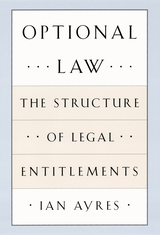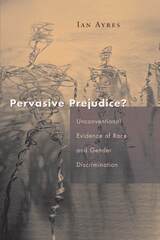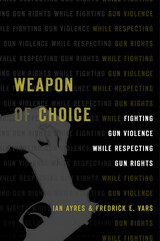
Ayres identifies flaws in the current system and shows how option theory can radically expand and improve the ways that lawmakers structure legal entitlements. An option-based system, Ayres shows, gives parties the option to purchase—or the option to sell—the relevant legal entitlement. Choosing to exercise a legal option forces decisionmakers to reveal information about their own valuation of the entitlement. And, as with auctions, entitlements in option-based law naturally flow to those who value them the most. Seeing legal entitlements through this lens suggests a variety of new entitlement structures from which lawmakers might choose. Optional Law provides a theory for determining which structure is likely to be most effective in harnessing parties' private information.
Proposing a practical approach to the foundational question of how to allocate and protect legal rights, Optional Law will be applauded by legal scholars and professionals who continue to seek new and better ways of fostering both equitable and efficient legal rules.

In Pervasive Prejudice? Ian Ayres confronts these questions and more. In a series of important studies he finds overwhelming evidence that in a variety of markets—retail car sales, bail bonding, kidney transplantation, and FCC licensing—blacks and females are consistently at a disadvantage. For example, when Ayres sent out agents of different races and genders posing as potential buyers to more than 200 car dealerships in Chicago, he found that dealers regularly charged blacks and women more than they charged white men. Other tests revealed that it is commonly more difficult for blacks than whites to receive a kidney transplant because of federal regulations. Moreover, Ayres found that minority male defendants are frequently required to post higher bail bonds than their Caucasian counterparts.
Traditional economic theory predicts that free markets should drive out discrimination, but Ayres's startling findings challenge that position. Along with empirical research, Ayres offers game—theoretic and other economic methodologies to show how prejudice can enter the bargaining process even when participants are supposedly acting as rational economic agents. He also responds to critics of his previously published studies included here. These studies suggest that race and gender discrimination is neither a thing of the past nor merely limited to the handful of markets that have been the traditional focus of civil rights laws.


How ordinary Americans, frustrated by the legal and political wrangling over the Second Amendment, can fight for reforms that will both respect gun owners’ rights and reduce gun violence.
Efforts to reduce gun violence in the United States face formidable political and constitutional barriers. Legislation that would ban or broadly restrict firearms runs afoul of the Supreme Court’s current interpretation of the Second Amendment. And gun rights advocates have joined a politically savvy firearms industry in a powerful coalition that stymies reform.
Ian Ayres and Fredrick Vars suggest a new way forward. We can decrease the number of gun deaths, they argue, by empowering individual citizens to choose common-sense gun reforms for themselves. Rather than ask politicians to impose one-size-fits-all rules, we can harness a libertarian approach—one that respects and expands individual freedom and personal choice—to combat the scourge of gun violence.
Ayres and Vars identify ten policies that can be immediately adopted at the state level to reduce the number of gun-related deaths without affecting the rights of gun owners. For example, Donna’s Law, a voluntary program whereby individuals can choose to restrict their ability to purchase or possess firearms, can significantly decrease suicide rates. Amending red flag statutes, which allow judges to restrict access to guns when an individual has shown evidence of dangerousness, can give police flexible and effective tools to keep people safe. Encouraging the use of unlawful possession petitions can help communities remove guns from more than a million Americans who are legally disqualified from owning them. By embracing these and other new forms of decentralized gun control, the United States can move past partisan gridlock and save lives now.
READERS
Browse our collection.
PUBLISHERS
See BiblioVault's publisher services.
STUDENT SERVICES
Files for college accessibility offices.
UChicago Accessibility Resources
home | accessibility | search | about | contact us
BiblioVault ® 2001 - 2024
The University of Chicago Press









